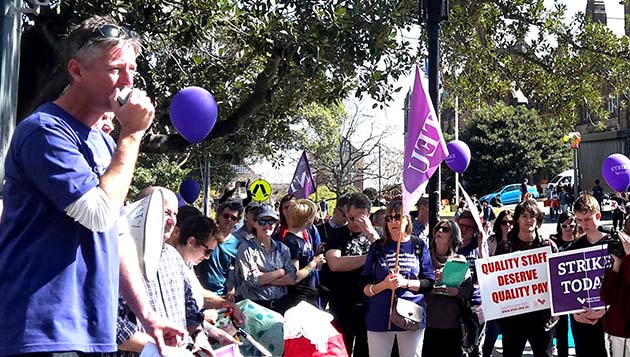The termination of the Enterprise Bargaining Agreement (EBA) at Murdoch University has sent a shock through the university system. The Fair Work decision gives university managements across the country a new weapon against staff and the NTEU—just the latest example of how the law is stacked against unions.
Management at Murdoch has agreed to maintain pay and conditions for six months, as talks on a new enterprise agreement continue. But if agreement is not reached in that time, salaries will fall as much as 39 per cent and superannuation, redundancy payouts and paid leave will all drop back to the basic Award levels.
The same tactics could be used in an effort to force staff at other universities into accepting worse EBAs. Liberal Education Minister, Simon Birmingham, crowed that the decision, “should be seized, and hopefully could be replicated elsewhere”.
Universities are always crying poor when it comes to staff wages and conditions. But last year, the 38 public university Vice-Chancellors around the country were paid an average salary package of $890,000 each. They are getting rich as they use international students as cash-cows and work staff, often on casual contracts, to the bone.
A co-ordinated fightback is needed across the sector to win better conditions and to send a clear message to Fair Work and university management that the Murdoch ruling will not be accepted.
Sydney University strikes
Staff at Sydney University are leading the way, kicking off a campaign of strikes in the fight to win a better EBA. A strike during the university Open Day in August was a huge success. Union members refused to staff stalls or give mini-lectures, forcing heads of schools and management to do much of the work themselves. Over 100 union members picketed major entrances to leaflet prospective students, and university shuttle buses were also stopped and leafleted.
Management then tried to cut the union out of negotiations and force a terrible agreement on staff by holding a snap online poll, asking employees if they wanted to directly vote on the university’s offer. They were embarrassed as staff made their opinion clear with a 61 per cent no vote.
A further strike is planned for 13 September as the campaign escalates. Management has refused to budge on four core issues.
The first is pay. Staff have put in extra hours to get a new curriculum ready that the university is eager to show off. Yet management wants us to accept a pay cut of 1.9 per cent over the life of the agreement.
Management also want to introduce 220 teaching-only positions that would threaten academics’ right to research time. And they are also still refusing to provide sick leave and 17 per cent superannuation for casuals.
Job security is another core issue. With a restructure already in motion at Sydney, the no forced redundancies clause is a particularly important one to win. Sydney College of the Arts (SCA) has been gutted. Staff in the Science Faculty say they are scared to take leave, fearing their position might disappear.
Redeployment rather than redundancy for all staff is very feasible considering there are more students and more work than ever before. Management claim that around 95 per cent of staff who want to stay on after a restructure are redeployed. But management prefers the “spill and fill” method of making whole work areas redundant and then inviting staff to re-apply for similar positions, sometimes on less pay.
Sector-wide fight
Restructures and mass redundancies are taking place across the sector, including at Western Sydney University (WSU) where 100 administration jobs are threatened, and in the education faculty at Melbourne University. Malcolm Turnbull’s $2.8 billion university cuts, announced in this year’s budget, are resulting in job cuts and attacks on staff nationwide.
Given the Murdoch ruling, the restructures taking place, and the Liberals’ cuts, there is a real need for a co-ordinated fightback in the sector.
In NSW alone, UTS, Sydney University and WSU are all currently in EBA negotiations. A joint strike day, with demonstrations at other universities, would step up the pressure on management to sign better EBAs, and could start the fightback against the increasing attacks on funding and working conditions in the sector.
By Vivian Honan






